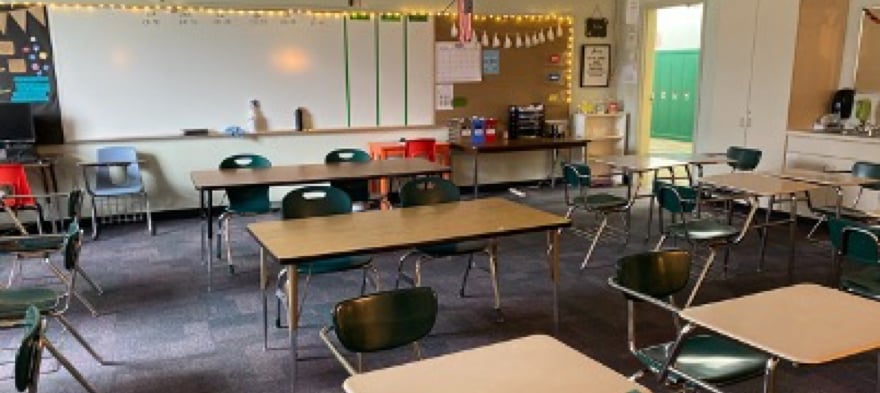
Apr 13, 2020 12:00:00 AM
As I gathered materials to take home on what should have been our second day back from spring break, my school’s first-year English teacher, McKenna Quinn, popped in to say hello. She was carrying a gigantic stack of books I had not seen her use all year. Books, no doubt, she would try to use for lessons that could be photocopied and sent home to all students. I would be doing the same.
Joking about how she must have missed that college course of teaching during a pandemic, she said, [pullquote position="right"]“We’re all first teachers now.”[/pullquote] I laughed. But later at home, deleting and reposting my assignment online multiple times because I kept doing it wrong, and then later being schooled on how I could have done it better—I could hear her words echoing in my soul. I was a first-year teacher. Again.
I don't relish the massive failures of my first year of teaching: Bombing lesson after lesson, not knowing how to manage a classroom, wondering how I was going to build genuine connections with students, spending hours on a lesson then realizing it wasn’t that good and that perhaps my efforts would be in vain, not really knowing how to grade assignments, constantly reeducating myself on the fly, comparing myself to others.
Then there were the feelings: Overwhelm, deep ambivalence, second-guessing, inadequacy. Indeed, I am experiencing many of these things now. I hear the nagging thought: “There’s got to be a better way!” while at the same time, not knowing what that better way could be.
But [pullquote]there's one thing I have now that I didn't have then: Grace. Grace for my students, for their parents, for my colleagues, for myself.[/pullquote]
In many ways, I was tormented by my shortcomings as a first-year teacher. I would reflect on everything that went wrong during my day, vow to do better tomorrow, lose sleep and then fail again. I was hostile to feedback because I was afraid of being judged. There were so many unanticipated moments, and everything unexpected sent me reeling. But now, as I awkwardly stumble through a Zoom session, I forgive myself and dwell on what—no, who—matters. My concerns about “covering” all the material have faded into oblivion.
Let’s start there. Let’s practice self-compassion and not wring our hands over what will not be covered. [pullquote position="right"]Our focus as teachers should rightly be the relationships we have built with our students[/pullquote], and how we can continue to cultivate those relationships to support them in whatever way needed. If this is not our guiding star, then why be in education? And if we accidentally botch the copying order of a packet (I did), or tell kids to log into Google Classroom using a code and then forget to provide the code (me again), let’s laugh together, reach out to students and lean on colleagues who can help.
Because here’s the thing: We are all first-year teachers in this moment. Some of our students are first-year exclusive online learners. And imagine the historic firsts for our students’ parents—some of us are living those, too. Look to those teachers who are months from retirement, who are doing nothing less than their best to figure out online platforms or research innovative practices. Look to our fresh-out-of-college teachers, or our long-term subs, who will offer revolutionizing ideas with unassuming enthusiasm. Look inside yourself, for there is greatness inside you if you can look past your feelings of doubt with the lens of grace.
Teaching through packets and online platforms today, there are so many parallels to my first year. I am calling families a lot. Like my first year, I spend hours inefficiently doing something that may only benefit a handful of students. For example, I spent about an hour using an app that I ultimately decided was terrible, threw out all my work and then reached out to colleagues for suggestions. Both a first-year teacher and a veteran teacher pointed to a better program. I loved the new recommended app, but the product I created from it benefited only six students. However, the conversations I held with both students and colleagues were meaningful and significant, so I grew as well.
So [pullquote]while we should not be cavalier about our mistakes, let's lean into the unknown together, affording all of those in our life—including ourselves—grace.[/pullquote] Make sure your students feel seen, even if you can’t see them. And forgive yourself for your shortcomings. Because whatever they are, I can assure you that your reach into the hearts of your students is far greater if you ground yourself in grace.
Dylan Huisken is the 2019 Montana Teacher of the Year. He teaches middle school social studies in Bonner, Montanna. Follow him on Twitter @2019MTTOY and follow McKenna Quinn @mckennaquinn_mt.
Few issues in education spark more tension and debate than standardized testing. Are they a tool for equity or a burden on students? A necessary check on school systems or a flawed measure of...
Charter schools are public schools with a purpose. Operating independently from traditional school districts, they're tuition-free, open to all students, and publicly funded—but with more flexibility...
Despite the benefits of a diverse teaching force, prospective teachers of color fall out of our leaky preparation pipeline at every stage: preparation, hiring, induction, and retention. Here’s what...
Ed Post is the flagship website platform of brightbeam, a 501(c3) network of education activists and influencers demanding a better education and a brighter future for every child.
© 2020-2025 brightbeam. All rights reserved.
Leave a Comment